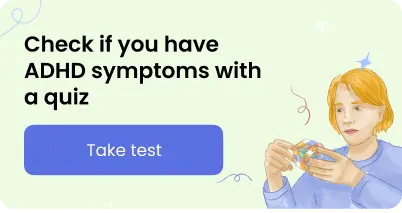Think you’re just wired differently? Ever wonder why you can’t seem to focus or why you’re constantly bouncing off the walls? While ADHD might explain some of your struggles, there’s a chance a more complex story is hidden.
The thing is that childhood trauma might be hiding beneath the surface for some people with ADHD. Probably, there is a real connection between these two experiences. And this isn’t just about blaming the past. It’s about understanding the present.
In this article, we’ll explore the complicated tie between ADHD and childhood trauma, which can help you to rewrite your narrative.
Must-know facts about ADHD and trauma
- Symptoms of ADHD can be caused by trauma.
- There is an overlap between ADHD and trauma, like difficulty concentrating, impulsivity, emotional dysregulation, and others, making diagnosis more complex.
- Childhood trauma can intensify ADHD symptoms and vice versa, creating a harmful cycle.
- Therapy, medication, and self-care strategies can help manage symptoms and promote healing.
Can the symptoms of ADHD be caused by trauma?
The short answer is yes.
Some experts suggest that people who experience early life trauma are more likely to develop symptoms of ADHD or ADHD-C (combined type) later.
Trauma-induced ADHD can be partly fueled by a phenomenon called “negative memory bias,” where stressful events can alter a person’s perspective, leading them to focus on negative experiences and emotions rather than positive ones.
Beyond negative memory bias, trauma may directly impact brain regions responsible for attention, impulse control, and emotional regulation, mimicking ADHD symptoms.
Additionally, hypervigilance, a common trauma response, may show up as distractibility and impulsivity.
If you feel like you need a helping hand to overcome negativity in your life, try Breeze. The app can help you track your negative thoughts and bring more balance to your life.
Effects of childhood trauma on ADHD symptoms
As it was said earlier, experiencing adverse events like emotional abuse, emotional neglect, or violence may affect the way the brain controls emotions, thoughts, and behavior, which may lead to ADHD.
But the thing is that trauma might make ADHD symptoms even more severe. This may manifest as heightened anxiety, difficulty concentrating, impulsive behavior, and hyperactivity, imitating ADHD symptoms.
Unfortunately, the story doesn’t end there. Children with ADHD symptoms may face more challenges and setbacks than their peers, leading to increased stress and frustration.
This, in turn, can trigger further negative experiences, creating a vicious cycle where trauma fuels ADHD symptoms, and ADHD symptoms increase the risk of further trauma.
What about ADHD vs. PTSD/CPTSD?
The answer is also positive.
PTSD (Post-traumatic Stress Disorder) and c-PTSD (Complex Trauma) are the result of enduring or recurring traumatic experiences, particularly in youth.
ADHD and PTSD/c-PTSD may share overlapping symptoms, making it difficult to distinguish between the two.
However, if we are considering shared symptoms for ADHD and PTSD/c-PTSD, can we say the same for ADHD and general trauma symptoms? Let’s explore this further in the next section.
Is there any overlap between ADHD and trauma?
Definitely yes.
For example, inattention and “daydreaming” behavior in ADHD may sometimes resemble symptoms of dissociation, a common response to trauma.
But there is more to say. Let’s explore the complete list of overlapping symptoms of ADHD and trauma below:
| Symptom | ADHD | Trauma | Shared? |
| Hard to concentrate | Difficulty focusing and staying on task. | Trouble focusing due to intrusive thoughts or flashbacks. | Yes |
| Impulsivity | Acting without thinking, blurting things out. | Difficulty controlling emotions or reactions. | Yes |
| Disorganization | Problems with organization and managing tasks. | Disorganization due to emotional distress or avoidance. | Yes |
| Sleep problems | Difficulty falling asleep or staying asleep. | Nightmares, flashbacks, sleep disturbances. | Yes |
| Emotional dysregulation | Irritability, anger, anxiety, depression. | Difficulty managing emotions due to trauma experience. | Yes |
| Hyperactivity/Fidgeting | Excessive movement, restlessness. | It can be, especially if someone is anxious or hypervigilant | Yes |
| Flashbacks | Not a symptom of ADHD. | Reliving past trauma in vivid detail. | No |
| Nightmares | Not typically a symptom of ADHD. | Disturbing dreams related to trauma. | No |
| Avoidance | Not usually a symptom of ADHD. | Avoiding people, places, or things associated with trauma. | No |
| Dissociation | Not typically a symptom of ADHD. | Feeling detached from oneself or surroundings. | No |
Even though ADHD and trauma can look similar in some ways, they affect people differently. Dr. James M. Greenblatt, an expert on ADHD, says, “In considering links between any two psychiatric disorders, it’s important to remember that there’s no such thing as black and white.”
So, while ADD and childhood trauma might have some symptoms to overlap, each person’s experience with them is unique.
ADHD, childhood trauma, and PTSD&CPTSD: A quick review
Now, for a deeper understanding, let’s explore ADHD, trauma, and PTSD&CPTSD individually.
A few words about ADHD
What is the meaning of ADHD disorder? Attention Deficit Hyperactivity Disorder or ADHD, is a common cognitive difference that affects millions of people (9% of children and 3% of adults) worldwide.
It’s characterized by a combination of symptoms like difficulty focusing, impulsivity, and hyperactivity (which works for PTSD, too) and is considered a visible part of the ADHD iceberg.
It’s important to note that ADHD and ADD are the same thing.
Essentially, there are three types of ADHD – impulsive, inattentive, and combined, with both symptoms (ADHD-C).
But what does ADD feel like? Someone with hyperactive ADHD might describe it as feeling like they have “ants in their pants,” while someone with impulsive ADHD might say they often feel a strong urge to “blurt things out”, even if it’s not appropriate.
While the exact causes remain under study, researchers believe genetics, brain injuries, prenatal substance exposure, and low birth weight may play a role.

Childhood Trauma & PTSD/CPTSD
Not everyone who experiences childhood trauma may develop PTSD or complex trauma, but it’s a significant risk factor. That’s why it’s essential to know what is the difference between these conditions.
So, what is the definition of childhood trauma? It refers to any adverse experience that harms a child emotionally, which may lead to long-term challenges such as fear, sadness, and difficulty trusting others. Examples include abuse, neglect, accidents, and exposure to violence.
PTSD is a mental health condition that might develop after experiencing a traumatic event. It’s also considered a form of neurodivergence like ADHD.
Some signs of trauma might be reliving the experience, having bad dreams, trying to avoid anything that reminds you of the event, feeling on edge, and not being able to feel your emotions.
What is complex trauma? It is a newer diagnosis that is closely related to PTSD. Still, it specifically refers to the effects of prolonged or repeated exposure to traumatic events, particularly in early childhood.
In addition to the symptoms of PTSD, people with C-PTSD may also experience difficulties with self-identity, emotional regulation, relationships, and a sense of safety.
Steps to take to help ADHD childhood trauma
Even if years have passed, childhood trauma can leave lasting marks on your well-being and mental health. If you suspect you might be affected, here’s how to get started:
Find a qualified therapist. Consulting with a doctor can help you get a treatment plan that is personalized to your needs.
This plan might combine different methods, like:
- Cognitive-behavioral therapy (CBT)
- Trauma-focused therapy
- Medications like antidepressants or ADHD medication to manage specific symptoms like mood fluctuations or focus issues.
Tips to take care of yourself
- Creative mind: Art and music therapy can help you express yourself, understand your human emotions, and reduce stress. It’s a great way to heal and create positive changes in your life.
- Mind & body practices: Explore yoga or meditation to improve your physical and mental well-being. Yoga involves breathing exercises and postures that help you relax and focus, while exercising can improve your mood and reduce stress.
- Breeze app: Breeze offers a complete package of tools to help you take care of your well-being effectively. You can explore various courses and take detailed tests to learn more about yourself.
- Start your journey by taking our ADHD quiz and Childhood Trauma test to gain valuable insights.
Remember: Healing takes time and patience. Celebrate every step of your journey, and know you’re not alone







